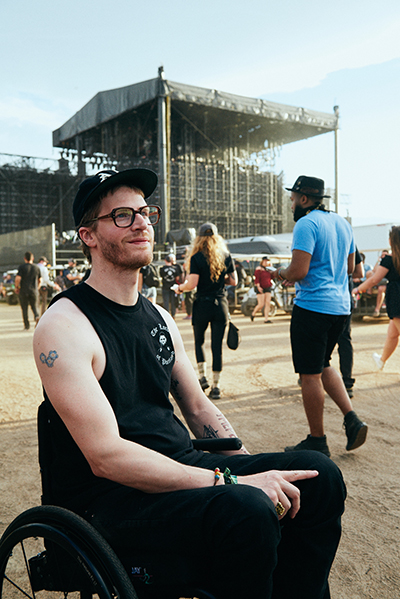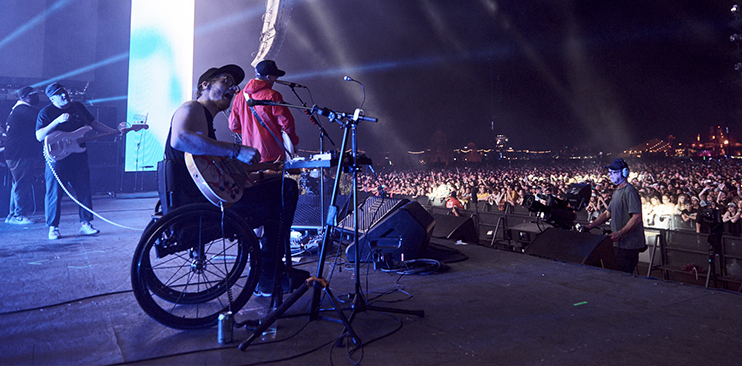QTell us about your love of music and where it all began?
AI grew up in Wasilla, Alaska. My parents were both heavily into music, so it was immediately part of my life. My Mom even named me after British musician, Eric Clapton! I started playing instruments in our garage the minute I was old enough.
QHow did you get involved with Portugal. The Man?
AI met John Gourley in elementary school and Zach Carothers in middle school. I had been off playing with various bands for years but had always kept tabs on PTM and knew they were doing great things.
From day one it was clear to me that this band was big. To join them would mean fully committing to a very busy lifestyle and giving up everything else. But I was up for it. In 2007, the band I was in was winding down, so I started talking to the guys about joining them. It was around that time I was involved in an accident and sustained a spinal cord injury.
QIn the initial aftermath of sustaining your injury, how did you feel?
AI had to figure my life back out. I was lucky my injury was high enough that I still had full use of my hands, so I could continue playing guitar. It was complicated but I was part of a fantastic music community in Seattle and they really rallied around me, it was a beautiful thing. They didn’t let me take time off, it wasn’t an option, we just kept going. Even when I was still in the ICU, my friend brought recording equipment in and got me to record some music with him. A few months post-injury, I was on stage, playing at a music festival.

QPortugal. The Man. tour all over the world; what are the levels of accessibility like?
AI’ve learned to never take accessibility for granted, regardless of how forward-thinking the country or city appears to be. Surprisingly, one of the worst I’ve experienced is Los Angeles. I’ve also noticed that access doesn’t always translate to the situation backstage. You can look up a venue which claims to have full accessibility and get there to find steps up to the Green Room. I can forgive a 200-year-old theatre for not being geared up with ramps but there are some newer buildings that also fall short. Lack of access becomes very apparent at music festivals. When you’re dealing with an area that was formerly a field and it’s been transformed into a festival ground that has inaccessible areas, you know that it’s been a conscious decision to make it that way. I’ve seen things change and it’s starting to get better, but we’ve still got a long way to go.
QDo you have a Top 5 list of accessible countries that you’ve visited?
A
-
- Number one would probably be Canada, so thank you for that (No problem, Eric, we got you! And we’re getting better!)
- Two is a place that really took me by surprise, Bogata in Columbia.
- Germany
- Switzerland
- And Barcelona in Spain is amazing!
QPeer mentorship is one of our core services. What words of advice would you give to someone who is newly injured?
AThe biggest thing I had to get over was fear. For a long time after sustaining my injury I was very nervous about leaving the house, I’d research everything to make sure it was accessible. Now I love the challenge, I just get out there and embrace whatever comes, if a place isn’t accessible, I’m more than happy to have that conversation and raise awareness for changes that would create a more inclusive environment. It’s important to be mindful of your body, look after yourself and keep an eye out for pressure sores. The thing to remember is, you’re still alive and you can still have your life back.
Photos: Maclay Herriot


